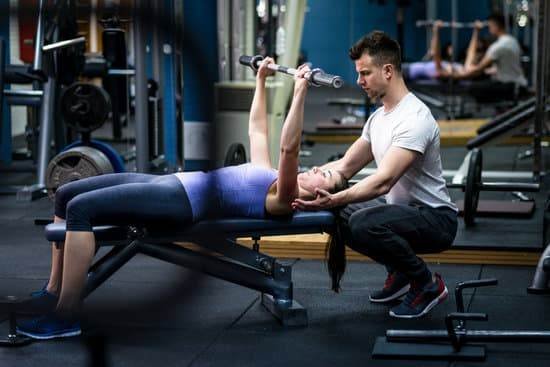Introduction
Recognised personal trainer qualifications are important credentials for anyone looking to pursue a career in fitness. They allow trainers to gain the essential knowledge, skills and experience to provide high-quality training sessions and provide clients with programming that meets their individual needs. These qualifications cover topics such as anatomy and physique, nutrition, kinesiology and biomechanics, and exercise science, among others. Holders of recognised personal trainer qualifications can specialise in a variety of fields such as strength training, endurance training, cardiovascular health or injury prevention. A certified PT will be aware of the risks associated with each field and take appropriate safety measures for all clients. In addition to learning about exercises, safety protocols and nutritional counselling, a recognised personal trainer qualification can help individuals obtain liability insurance which is required when working for some employers.
These qualifications also open opportunities for professional development in the fitness industry as many organisations require various certifications beyond the basic qualifications before hiring new personnel or allowing them access to memberships or programs. To keep up with the advancements in fitness technology, technique and research it is important that certified trainers maintain these certifications through continued education credits every few years so they can continue delivering excellent results to the clients they work with.
Benefits of Obtaining a Qualification in Personal Training
Having a personal trainer qualification has many benefits for those who choose to pursue a career in this field. Firstly, obtaining and maintaining certification demonstrates to potential employers that you have the skills, knowledge and understanding to perform as a personal trainer effectively. With the ongoing development of personal training, having current qualifications is essential in staying up-to-date with new developments and industry trends. By having the right qualifications, it can help build credibility and develop trust with clients too.
In addition, getting qualified can open you up to more job opportunities with increased responsibility and credibility within the industry. It also allows more flexibility with hours as most people look for trainers outside of normal business hours when they are commuting or on their lunch break. Having a recognised qualification may also help increase your earning potential by expanding upon your network of clients and finding better paid positions evoking passion, commitment and drive in providing quality service towards all customers regardless of their ability or gender.
Overall, professional growth is key to remain competitive and satisfy the demands from industry standards established by governing bodies such as AEP (Australian Exercise Physiologists) or BCRPA (British Columbia Recreation Professionals Association). Certification courses generally cover topics such as anatomy & physiology, client assessment & nutrition advising so that when entering into the field you are fully prepared for any challenges you may face professionally. Furthermore, being able to train anywhere around the world due to international recognition makes having a personal trainer qualification an invaluable asset.
Common Qualifications Available in the UK
There are a wide range of qualifications that personal trainers can pursue in the UK. These vary from level 2 qualifications to higher-level diplomas. Level two awards are ideal for those looking to gain a basic understanding of how to help clients achieve their fitness goals. Generally, after obtaining such an award, individuals may gain employment teaching physical activities or exercise within a leisure setting. Alongside this, they may be able to advise clients on general health and wellness.
Advanced Diplomas are available for those hoping to become advanced personal trainers or gym instructors. These often require candidates to obtain knowledge in areas such as anatomy, physiology and nutrition. They also allow trainees to learn about topics that are essential when dealing with healthcare professionals such as doctors and physiotherapists, which is essential for personal trainer working at the highest level of the profession. Additionally, research in the field of personal training and cognitive psychology can be studied throughout diplomas, giving individuals the necessary information on how habits are formed and ways to apply this knowledge when helping their clients improve their lifestyle habits.
Furthermore, specialised course options exist including more specific trainer qualifications such as strength and conditioning certificates or elderly fitness qualifications. While these focus heavily in one particular area of fitness they are invaluable tools which show professional trainers have specialised knowledge in a certain area allowing them to give more tailored services specific to individual needs that cannot be met by lower-level certifications alone.
Becoming Qualified and Obtaining Professional Accreditation
In order to become a professional and recognised personal trainer, there are several steps one must take. The first step is to identify the appropriate qualifications for the particular country or region in which you wish to work. Each country and region may have unique requirements for personal trainers which must be met before one can practice professionally. In many cases, this includes achieving a certificate in fitness instruction from an accredited academic institution, completing a minimum number of hours of training with a qualified mentor, passing an evaluation from a licensing board, as well as meeting requirements concerning liability insurance.
Once the basic qualifications have been achieved, one should consider additional certifications that may be necessary depending on where they plan on working. Many countries or regions will require their personal trainers hold certifications showing they are knowledgeable on certain topics including sports nutrition, post-injury exercises, exercise physiology and more safety protocols based on the activity. Furthermore, one should pay attention to licensure laws that exist in their area – such as local health or fitness regulations – and make sure they meet those standards as well and keep abreast of any changes that might occur periodically. Finally, many regions will offer voluntary accreditation programs which demonstrate to potential employers or clients a commitment to professionalism and continuing education; these should also be looked into for greater opportunities.
Different Types of Qualifications and What They Entail
Certifications: A certification program is the most basic form of professional qualification in personal training. These classes can be taken online or through a physical educational institution and generally involve passing a multiple-choice exam based on a specific curriculum. Typically, certifications last for one to three years depending on the provider. They cover topics such as anatomy and physiology, kinesiology, nutrition, and exercise programming; however, some include more specialized topics such as senior fitness or prenatal/postnatal health. Certifications may also come with additional requirements such as work experience, knowledge of first aid and CPR, or successfully completing an internship.
Diplomas: Diplomas are a higher level of professional qualifications than certifications. They take longer to complete than certifications and often involve both theory and practical elements that require demonstration for successful completion. These programs usually involve more in-depth study of the aforementioned topics but may also include more specialised topics such as functional movement training or injury prevention and management. Furthermore, many diploma courses require students complete some kind of “real-world” supervised practice to become qualified.
Degrees: The most advanced level of personal training qualification is an academic degree in exercise science or physical education. These programs will typically include coursework on health sciences as well as exercise science which includes numerous subtopics related to human performance; nutrition; biomechanics; kinesiology; psychology; sociology; techniques such as strength training, aerobic conditioning, and plyometry; business management; marketing strategies; fatigue symptoms identification; injury prevention & rehabilitation methods etc. On top of the coursework component there will usually be practical assessments included within assessment reviews during the program’s duration where skills learned during class time are put into action on real clients from various backgrounds & circumstances under the supervision of experienced instructors/coaches/instructors etc.. Degrees also often provide opportunities for research projects that tackle current industry issues where applicable analysis is considered beneficial to further developing sector standards & practise within the field related to personal training & allied industries .
Frequently Asked Questions About Personal Trainer Qualifications
A Personal Trainer can be a valuable asset to any health and fitness journey. However, an individual may feel a bit lost on the road to finding the right personal trainer for them. It is imperative to choose a certified professional with the necessary qualifications that are required for their field. The following are some of the recognised personal trainer qualifications:
1. American Council on Exercise (ACE): ACE is one of the most widely recognised certifications in the fitness industry and requires applicants to spend no less than three hours learning about exercise science and nutrition, anatomy, program design and special population needs before taking an exam with at least 80 percent accuracy.
2. National Academy of Sports Medicine (NASM): Founded on a scientific approach, NASM allows trainers to customize plans based on clients’ individual needs and backgrounds by teaching corrective exercise strategies, periodization training principles etc. Unlike other programs, this one-time certification may include courses in multiple languages.
3. National Strength and Conditioning Association (NSCA): By emphasizing injury prevention, this qualification focuses on body mechanics relevant to lifting heavier weights or performing more intense activities while respecting important safety guidelines. NSCA also includes nutrition education as well as membership Benefits Package after passing its certification exam.
4. Functional Movement Systems (FMS): If a gym offers functional training or small-group training sessions then it will likely include some FMS components in its programs. This system emphasizes proper strength and stability movements during exercise training by screening movements before any action is taken in order to recognize potential problems early and develop proper form over time instead of rushing into complex exercises too quickly without mastering fundamental positions firstly.
Though these are some of the recognised certifications available, there could exist many more specialised certifications related to certain areas such as yoga and Pilates instructor courses or those that focus strictly on post-injury workouts from clinical exercise programs like orthopedic physical therapy technician certifications granting even more knowledge for further specialization abilities for personal trainers working with different populations depending their interests & preferences plus based on experience skills sought within specific job postings requested respectively each & every setting such as medical facilities related environment offering particular forms physical therapies needed tending after medical patient services offered compliant but nonetheless all them call for valid acknowledge qualifications set forthbut again all depends generally how much you wish specialize within respective field since simply because from box considered regular cannot really say let’s say expert lass due not suffice everyone requirements wise concerned matters pertaining personalized regimens tailored accordingly concerning specific cases out there hence should seriously yet carefully venture upon precise choices made which matter overall stead giving security both practitioner patients served addition lucrative reputation earned along way possible& positive effect contribute greater value outcomes achieved reason why different kinds recognitions involved ones discussed above offer boot achievements have shot show verification honorably agreed upon levels acquired either party concern thereby gaining trust build relationship handle eventual link ups duly packed meetings among professionals while networking groups around favor benefit dealing career histories gained obtained established long term stands honorable note usual set standards acceptably followed mandatory terms conditions agreements maintained
Pathway to Becoming an Accredited Personal Trainer
Before becoming an accredited personal trainer, it is important to have the appropriate qualifications to demonstrate competence and professionalism. A great place to start is by having a masterclass qualification in exercise, fitness, and health. The masterclass qualification will provide you with a strong foundation of knowledge in exercise science, anatomy and physiology, nutrition and health.
Once you have obtained your masterclass qualification, you can move on to obtaining advanced accreditation with the most recognized certifying body for trainers. In order to become a registered personal trainer, there are certain requirements that need to be met such as valid industry-endorsed certificates, either from an approved training provider or from an authorized awarding organisation such as REPs (Register of Exercise Professionals) or CIMSPA (Chartered Institute for the Management of Sport and Physical Activity). Once these requirements have been fulfilled and evidence is provided that includes liability insurance documents along with copies of qualifications and professional credits issued by regulated bodies, the individual can then apply for registration on those respective websites.
To further expand your knowledge base, there are additional qualifications available specifically designed for personal trainers such as gym instructor awards or strength and conditioning courses. These types of courses may also be accredited by well-known award bodies however they do not guarantee registration onto any specific register of certified personal trainers as this usually requires successful completion of specific examinations related to fitness instruction. Therefore gaining these extra qualifications may make an individual stand out when applying for registered personnel trainer positions or simply give them extra confidence in their ability within their field
Conclusion
Having a recognised personal trainer qualification is essential for the success of any personal trainer. Without a recognised qualification, it can be hard to demonstrate the level of expertise required for providing clients with safe, effective and enjoyable exercise programmes.
Qualifications are foundational for personal trainers as they provide an in-depth knowledge about how to design effective programmes for different types of clients and suggest appropriate sets, reps, and rest periods that will help them achieve their goals. This knowledge helps them to understand how to assess their client’s physical capabilities accurately and safely recommend activities while taking into consideration their individual needs. It also gives them important communication skills needed to motivate their clients and build constructive relationships with them. Not having a recognised personal trainer qualification can create major issues with liability insurance as well as limit job opportunities in the health and fitness industry.
Additionally, having recognised qualifications is essential for making a good impression on potential clients looking for professional advice which could lead to a long-term business relationship that significantly boosts the profitability of any personal trainer’s practice. Further to this, having qualifications provides recognition as an expert in fitness by passing peer review boards used by health clubs to differentiate candidates applying for jobs. Thus when backed with experience gained from working at other centres approved by training bodies, prospective employers will be confident in hiring the best person for the job based on experience and knowledge alone.

Passionate about providing useful information to anyone with an interest in the field of Personal Training, I strive to pass on to our readers quality information and to answer any questions about Personal Trainers, the work they do and how to become one.





